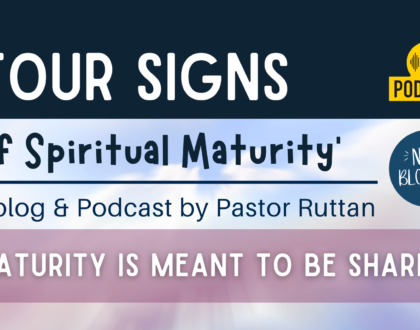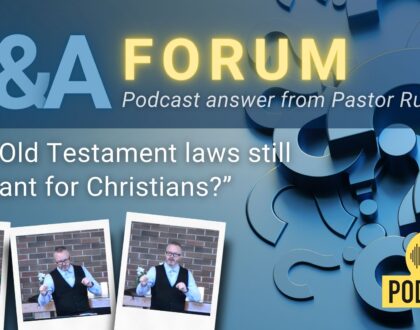From a Magical Bunny to a Bloody Cross — 6 Common Q & A’s about Easter
by Westminster
What do a magical bunny, chocolate, a bloody cross, and an empty tomb all have in common?
They all make an appearance on Easter weekend.
Since I often get asked a bunch of questions related to Easter, I’ve put some answers together in one place.
1. Why does the date always change?
Easter is based on the Paschal Full Moon. Since it’s based on the lunar schedule it fluctuates. But it’s always between March 21 and April 25.
2. What does the word “Easter” actually mean?
Some word-origin dictionaries trace it through various languages meaning different spring-ish things. According to another person it’s connected to an old Anglo-Saxon spring or fertility goddess called “Eostre.” But as Christianity grew, it took over the name for its own celebration that just so happened to coincide with the same time of year.
In short, it’s hard to be sure. But in Christianity the celebration is not connected to the word itself. Now we just use the word Easter to refer to the celebration of Jesus’ crucifixion and resurrection.
3. What is “Maundy Thursday” about?
This is the Thursday before Easter and is from the Latin translation of Jesus’ words in John 13:34, “mandatum novum,” meaning “new command.” Here’s the full verse: “A new command I give you: Love one another. As I have loved you, so you must love one another.”
On Maundy Thursday some churches have services to remember this command to love one another. Some remember when Jesus washed his disciples’ feet, and most tend to celebrate The Lord’s Supper (Eucharist) as well.
4. If Good Friday was when Jesus died on the cross, why is it called good?
In terms of the name, there are a few different explanations. But the best one is that it is the day when Jesus paid the price for humanity’s sins. I call it the “surprising generous exchange.” Here’s why.
We’re all broken sinners. It’s hard to hear this difficult, awkward fact in the age of pseudo-positivity, but it’s true! We all dishonour God, fail to live out his commands, and don’t love others as we should. And one day we will all need to answer to God for our wrongs—words, deeds, and even thoughts.
But when you place your trust in Jesus as God’s own Son, and when you ask God to forgive your sins, Jesus takes those sins and wrongdoing upon himself on the cross.
As a result, God won’t count your sins against you (because Jesus has already paid for them). Instead, he credits the goodness and perfection of Jesus to your account!
That’s why it’s a surprising, generous exchange!
Since he took upon himself what you and I deserve, it is a day of good news for those who accept this free gift. Therefore, Good Friday isn’t “good” because of what happened to Jesus, but because of what happened for you.
"Good Friday isn't "good" because of what happened to #Jesus, but because of what happened for you." #GoodFriday #GoodFriday2018
— Matthew Ruttan (@MatthewRuttan) March 29, 2018
A key thing here is this. Christianity is about a Saviour more than behaviour. Through faith, you can be made right with God not because of how good you are, but because of how good Jesus is.
5. How do the Easter bunny and chocolate eggs fit into all this?
I’ll admit that I’m no expert on this one, but I did a bit of research. Here’s what I found out.
It seems the first records of an Easter bunny are from the 1500’s. Some sources trace its passage to North America from German immigrants who had traditions of a bunny (and sometimes, a man!) who left eggs for good kids the night before Easter Sunday.
Notice the similarity to Christmas: Goods are left on the night before the holiday—and only for well-behaved children.
Since bunnies seem to reproduce themselves at astronomical rates they are symbols of fertility and spring. Eggs also symbolize new life. Put them together and poof! Bunny delivering egg-ish sweetness. Plus, I’m pretty sure the economy appreciates the sales bump.
(I should also say that some people, including myself, use cracked-open eggs to symbolize the empty tomb from the resurrection story.)
So how do the Easter bunny and eggs fit into the Christian celebration of Easter? They have no formal connection. But it’s one of those things society does that can be leveraged to help us celebrate something more important. Plus, who doesn’t like chocolate?
6. Did the resurrection actually happen?
To me, everything rises and falls with the resurrection.
In fact, it turned the disciples from cowards into lions of courage. Most of them were martyred for their faith. (And you don’t die for a lie.) Jesus appeared to many eyewitnesses, many of whom were alive when the stories were written down (and therefore could have easily been refuted if they weren’t true). Plus, the stories themselves include details which bolster their historic credibility.
In other words, yes, it did actually happen. If you were there, you would have seen Jesus walking around talking to people. For many, this will of course be an article of faith. But its significance to Christians can’t be underestimated. It’s ground zero.
Christians also believe that the cross and empty tomb were (and are) the decisive moment in human history. With the resurrection, God offers us a bit of foresight into what life will be like for anyone who wants to be enlisted in the cause of Jesus—a reality where death and fear will lose all power; where there will be no mourning, crying or pain; and where fullness of joy, peace, celebration and community will finally all come together. It’s like the resurrection is a movie trailer for God’s incredible future.
So whoever you are, I hope these answers have been helpful to some of your questions, and I also hope you have a great Easter.
Let me leave you with one of my favourite Easter quotes by Bible scholar Tom Wright: “Easter was when Hope in person surprised the whole world by coming forward from the future into the present.”
Recommended Posts

Four Signs of Spiritual Maturity
April 25, 2024
![Firm Faith in the Resurrection [Series Summary]](https://westminsterpc.ca/wp-content/uploads/2024/04/Apr.21-Sunday-Slides-Presentation2-420x330.jpg)
Firm Faith in the Resurrection [Series Summary]
April 18, 2024
